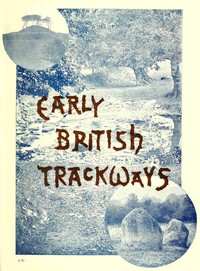Early British trackways, moats, mounds, camps, and sites by Alfred Watkins
"Early British Trackways, Moats, Mounds, Camps, and Sites" by Alfred Watkins is a historical account written in the early 20th century. The book meticulously investigates the ancient trackways and associated structures in Britain, delving into their design and function from prehistoric times through the Roman occupation. Watkins proposes a systematic approach to understanding how these features were interconnected and the implications of their layouts for early human activity and navigation. At the
start of the work, the author reflects on the prevailing misconceptions surrounding the study of ancient trackways, highlighting the need for new evidence and methods to uncover their true nature. He outlines how his exploration of maps and field observations led to the discovery of sighting lines linking various structures, such as mounds, moats, and churches. Watkins calls upon readers to engage in their own investigations, providing a rationale grounded in physical evidence and urging a collaborative effort to re-evaluate previous conclusions held by antiquarians. This opening portion sets the stage for a deeper exploration of how these ancient routes and landmarks are aligned in ways that reveal a sophisticated planning system employed by early Britons. (This is an automatically generated summary.)
Read or download for free
| How to read | Url | Size | |||
|---|---|---|---|---|---|
| Read now! | https://www.gutenberg.org/ebooks/69934.html.images | 185 kB | |||
| EPUB3 (E-readers incl. Send-to-Kindle) | https://www.gutenberg.org/ebooks/69934.epub3.images | 2.4 MB | |||
| EPUB (older E-readers) | https://www.gutenberg.org/ebooks/69934.epub.images | 2.4 MB | |||
| EPUB (no images, older E-readers) | https://www.gutenberg.org/ebooks/69934.epub.noimages | 123 kB | |||
| Kindle | https://www.gutenberg.org/ebooks/69934.kf8.images | 2.5 MB | |||
| older Kindles | https://www.gutenberg.org/ebooks/69934.kindle.images | 2.4 MB | |||
| Plain Text UTF-8 | https://www.gutenberg.org/ebooks/69934.txt.utf-8 | 115 kB | |||
| Download HTML (zip) | https://www.gutenberg.org/cache/epub/69934/pg69934-h.zip | 2.2 MB | |||
| There may be more files related to this item. | |||||
Similar Books
About this eBook
| Author | Watkins, Alfred, 1855-1935 |
|---|---|
| Title | Early British trackways, moats, mounds, camps, and sites |
| Original Publication | United Kingdom: Watkins Meter Co., 1922. |
| Note | Reading ease score: 77.7 (7th grade). Fairly easy to read. |
| Contents | Outline of conclusions -- Proof -- The ley -- Antiquity of the ley -- Individuality of the ley -- Mounds -- Earth-cuttings -- Water sighting-points -- Mark-stones -- Sighting stones -- Trees -- Camps -- Churches -- Castles -- Traders' roads -- Hereford trackways -- Traditional wells -- Previous data -- Roman roads -- Place names -- Discovery by place name -- The ley-men -- Hints to ley-hunters -- A few leys -- Endword. |
| Credits | Tim Lindell, Karin Spence and the Online Distributed Proofreading Team at https://www.pgdp.net (This file was produced from images generously made available by The Internet Archive/Canadian Libraries) |
| Language | English |
| LoC Class | GN: Geography, Anthropology, Recreation: Anthropology |
| Subject | Great Britain -- Antiquities |
| Subject | Mounds -- Great Britain |
| Subject | Megalithic monuments -- Great Britain |
| Subject | Leys -- Great Britain |
| Category | Text |
| EBook-No. | 69934 |
| Release Date | Feb 2, 2023 |
| Copyright Status | Public domain in the USA. |
| Downloads | 219 downloads in the last 30 days. |
| Project Gutenberg eBooks are always free! | |


